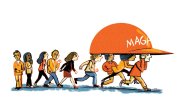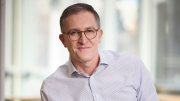public service and family figured prominently in the Commencement ceremony held at the Harvard Kennedy School (HKS) on June 3. Dean David Ellwood began by noting the dozens of national flags decorating the room, each representing the country of one or more of the school's imminent degree recipients, and then thanked all the students' families "for sharing a loved one with us." Soon he invited M.P.P. candidate Ned Sebelius to introduce his mother, U.S. Secretary of Health and Human Services Kathleen Sebelius, the guest speaker: the former governor of Kansas, a visiting fellow at the school in 2007, is the daughter of the late John J. Gilligan, a fellow at the Institute of Politics in 1969 who served in the U.S. House and as governor of Ohio.
Sebelius, who invited the degree candidates to thank their families with applause, said that she sees family and public service "as two points in the same continuum...my family has always been my support network. It's from them that I draw my inspiration to serve others, and my encouragement along the way." Serving in political office, she continued, "has always been less about the wins and the losses, and more about finding common goals and the best way to accomplish those goals." Her political heroes, she noted—her father, John and Robert Kennedy, and Barack Obama—“always stressed the importance of their families in keeping them centered and measuring how we should treat one another."
That grounding by friends and family, their own previous achievements, and the educational and collegial experiences provided by the Kennedy School, she said, would give the new graduates the tools they needed to navigate in a changed world while making improvements to benefit those most in need. "It's not the title you hold, but the work you do," she reminded them, whether the field is children's education, healthcare, climate change, or political service.
Addressing these issues, she acknowledged, would not be easy: "Your ideals and beliefs will be challenged, your self-interest may be at stake. Making choices will require some moral courage, what Robert Kennedy described as a rarer commodity than bravery in battle or great intelligence: the one essential vital quality of those who seek to change a world which yields most painfully to change." Her own years in public service, she said, have taught her that moral courage
is rare and powerful. It's a source of tremendous strength when the odds are long; it's a foundation that will help you both defend and challenge your own beliefs, and in situations where you may be tempted to silence or sit back, your moral courage will be your greatest advantage.
"I hope you remember Robert Kennedy's words and are never without your moral courage," she concluded. "I hope you will take comfort in being uncomfortable, that you'll choose to serve and contribute...I hope you'll embrace this incredible moment...and work with your generation to solve the problems that have plagued our world for too long....
"We can't wait to see what you do next."




